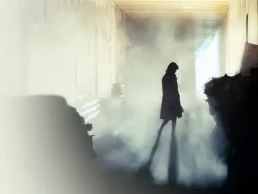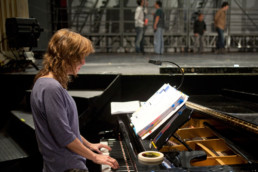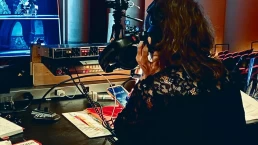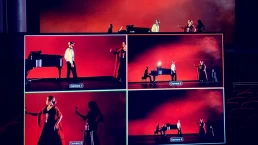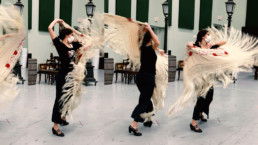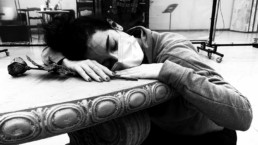In conversation with Chía Patiño, the stage director of Orpheus & Eurydice, Seattle Opera.
September 30, 2021
In conversation with Chía Patiño, the stage director of Orpheus & Eurydice
Seattle Opera.
Taken from www.seattleoperablog.com
Born in Ecuador, Chía Patiño was the Artistic and Executive Director of the National Theatre in Ecuador for 10 years before joining the Butler School of Music at the University of Texas-Austin in 2019 as the Stage Director for the Butler Opera Center. Her path has been eclectic: she began as a pianist, continued as a composer, and began a parallel path as a stage director in 1998. She has staged zarzuela, musical theater, theater, and opera for numerous companies in the United States, Arab Emirates, Egypt, Guatemala, Colombia and Ecuador. Productions she has directed include: Tosca, Traviata, Transformations, Rusalka, Dido and Aeneas, Carmen, Sweeney Todd, Luis Fernanda, West Side Story, Les Miserables, La Flauta Mágica de Los Andes, Faust and Don Giovanni. In 2009, she was the music director of the mariachi opera commissioned and produced by Houston Grand Opera, Cruzar la Cara de la Luna. This is Patiño Seattle Opera debut.
SEATTLE OPERA: Is it true that you and Christina (Scheppelmann) have known each for a long time?
CHÍA PATIÑO: Yes, it is true. We first met at Washington National Opera. I was in the young artist program at the time and Christina was one of the big bosses. We have kept in touch, and over the years, we have tried to see each other. I missed her by a few days when she was working in Barcelona. Years later, we were able to connect in Madrid at a combined Opera America, Opera Latin America, and Opera Europa conference.
SEATTLE OPERA: Do you come from a musical family?
CHÍA PATIÑO: My family is very musical. My parents often fought over who has the best ear for music. My dad thought he did. The word ear in Spanish has two meanings. Either it can mean the body part or it can mean the act of hearing. My father always thought he had the best ear for music, because he had large ears. In actuality, my mother has the best ear for music. My sister is a pianist, living in London. All of my uncles and cousins are amazing amateur musicians. At family gatherings, there is lots of singing and playing the guitar and piano. It turns out that talent does run in the family genes.
SEATTLE OPERA: Can you point to a mentor who inspired you?
CHÍA PATIÑO: Doris Keyes, my piano professor at the University of Louisville, was very influential in my early training. She taught my sister first—the one in London. My sister was completely in love with Doris. My sister compelled me to come to America. At that time, I was not sure I wanted to study music. Doris made me see that I was a musician. Doris was married to a composer, she loved the idea of me becoming a composer. Sadly, her husband died in an accident the summer before I was to start studying with him.
SEATTLE OPERA: Your adaptation of Mozart’s The Magic Flute, La flauta mágica de los Andes, was widely praised. How did it come together?
CHÍA PATIÑO: The reason we began thinking about an adaptation in the first place was that we did not have the orchestra needed to perform it.
SEATTLE OPERA: Really, please explain.
CHÍA PATIÑO: What we did have was a transcription of the music using traditional instruments from the Andes that was written for the Segundo Condor, the theater’s Andean Instrument Orchestra. The plan was still to sing the opera in German. One day, I was in a small village researching native clothing. I was visiting an indigenous dressmaker, telling her the story of The Magic Flute. At first, I didn’t think she would understand the story, but she did. She followed the story completely. We had the sound and I thought we needed the language. I translated the opera into Spanish and that delayed the project. Then I thought, why not add Kichwa (Quechua), the language of the indigenous people.
SEATTLE OPERA: The look was indigenous also?
CHÍA PATIÑO: The look was completely indigenous. We used indigenous artisans to build the costumes, which completely freaked out the designer. The indigenous people do not believe in cutting fabric. They wrap the fabric around themselves until it takes desired shape they want. Then they stop the loom, they don’t cut.
CHÍA PATIÑO: Those decisions were right. The project took almost three years to produce. Everything was time consuming; however, it was worth it! Many native people came to see it. People who did not know anything about opera still came. They only knew there were going to hear native singing and instruments and see native costumes. That was enough to bring them in, and they came!
SEATTLE OPERA: What attracted you to Seattle Opera’s production of Orpheus & Eurydice?
CHÍA PATIÑO: I wanted to explore our relationship with death, especially in this time of COVID. In Latin America, the pandemic has been very bad—everyone knows someone who has died from it. I lost an uncle at the very beginning of the pandemic. Then I lost a good friend. On the night, I learned that my friend had it, I prayed for his life. I had not prayed since I was 15. I started praying because he has three kids and I really wanted him to pull through. I got reports from his brother and from his wife: he was diabetic, he was connected to a ventilator, his kidneys were in bad shape, his liver was damaged, his eyesight affected, and his lungs had collapsed. If he could come back, what type of life would he have? How would his family cope? He would have a tough life. For me, I thought it best that he pass away.
I began to question our obsession with life and living, especially when it isn’t the best thing for the person who is dying. For me to love my friend I had to accept that he had to die. After my friend died, I called Christina (Scheppelmann) and told her that I needed to change the ending. I needed to shift my perspective of Orpheus. If Orpheus really loves Eurydice, he has to accept that she must die. I could not have Orpheus drag Eurydice from paradise. That’s not heroic to me. If anything, I believe, COVID has taught us that we have to make peace with death. It is all right for a person to die, because it is their time. This performance is a meditation about the times that we are living through.
Seattle Opera presents Orpheus & Eurydice Jan. 12-30, 2022 at McCaw Hall. For tickets, casting, and more information, go to seattleopera.org/orpheus.
Dreaming / Undreaming
(ENG)
Originally commissioned and premiered by the Princeton Festival in June 2017 to wonderful reviews as an art-music video, Dreaming/Undreaming will be presented at Ear Taxi in a new mixed media version, with pianist Natasha Stojanovska playing live while the art videos by Camilla Tassi and Ryan Belock are projected in real time, featuring dramaturgy by Chia Patiño and movement by Alexa Capareda.
There will be two versions of this project. In the first concert on Saturday, September 18 at 7:30 pm, Dreaming/Undreaming will deliver the relationship between videos and the music originally designed by the project creators. In the second concert on Sunday, September 19 at 3 pm, the audience will be asked to select the order of the videos to accompany the music. Adventurous audiences are encouraged to attend both versions, to enjoy the diversity and surprises of perception once the video sequence is changed between them. All ticket-holders will be able to enter a website afterwards and watch both the Princeton and the Chicago versions of Dreaming/Undreaming to compare the experiences! Learn more about Kosmologia and Dreaming/Undreaming here!
Dates and Times:
Saturday September 18, 7:30 pm / Sunday, September 19, 3 pm
September 10, 2021
Dreaming/Undreaming
September 18 and 19, 2021 - Ear Taxi Festival in Chicago
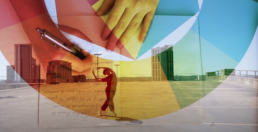
(ESP)
Dreaming / Undreaming, originalmente encargado y estrenado por el Festival de Princeton en junio de 2017 con excelentes críticas como un video musical artístico, se presentará en Ear Taxi en una nueva versión de medios mixtos, con la pianista Natasha Stojanovska tocando en vivo mientras los videos artísticos de Camilla Tassi y Ryan Belock se proyectan en tiempo real, con dramaturgia de Chia Patiño y movimiento de Alexa Capareda. Habrá dos versiones de este proyecto. En el primer concierto el sábado 18 de septiembre a las 7:30 pm, Dreaming / Undreaming entregará la relación entre los videos y la música originalmente diseñada por los creadores del proyecto. En el segundo concierto el domingo 19 de septiembre a las 15 horas, se pedirá al público que seleccione el orden de los videos para acompañar la música. Se anima al público aventurero a asistir a ambas versiones, para disfrutar de la diversidad y las sorpresas de la percepción una vez que se cambia la secuencia de video entre ellos. ¡Todos los poseedores de boletos podrán ingresar a un sitio web después y ver las versiones de Princeton y Chicago de Dreaming / Undreaming para comparar las experiencias! ¡Aprenda más sobre Kosmologia y Dreaming / Undreaming aquí!
ADA Welcomes Chía Patiño
September 05, 2021
ADA
Welcomes Chía Patiño
As of today I’m officially being represented by ADA Artist Management, I am very excited to join their roster! Click the button below to visit my profile at ADA Artis Management website.
La reconocida agencia norteamericana suma a su grupo de artistas a la directora escénica Chía Patiño.
“ADA trabaja para identificar nuevos talentos y fomentar las carreras de los mejores artistas que se destacan en una variedad de géneros y repertorios, desde artistas emergentes hasta artistas de renombre internacional. La agencia trabaja desde 2004 en construir relaciones positivas en toda la industria.”
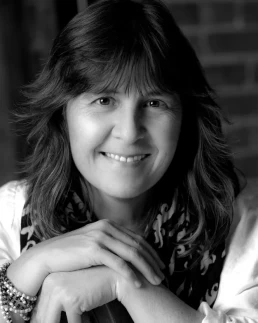
Upcoming events 2021-22
Upcoming events / Próximos eventos
Orpheus & Eurydice
Music by Christoph Willibald Gluck; Libretto by Ranieri de' Calzabigi
How far would you be willing to go for true love? Travel with Orpheus through an ever-shifting kaleidoscope of darkness and light, as he seeks to rescue his beloved wife Eurydice from the underworld. Set in the intimate Tagney Jones Hall at the Opera Center, with three principal singers and a small orchestra, this captivating production offers a front-row seat to sublime melodies and breathtaking drama. Chía Patiño, former head of Ecuador’s National Theatre, creates an all-new production that puts viewers in the midst of the action, and blurs the line between fantasy and reality.
Jan. 12, 13, 14, 15, 16, 19, 20, 21, 22, 23, 26, 27, 28, 29, & 30, 2022.
Tagney Jones Hall, Opera Center
space
Remembering Daniel Catán
Remembering Daniel Catán
Taken from Wise Music Classical, for complete article please fallow the link below.
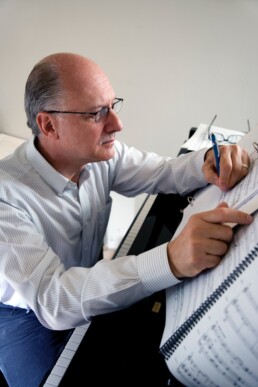
Ten years ago this month, the classical music community was shocked by the sudden death of beloved composer Daniel Catán. The loss was most keenly felt in the opera world, where artistic leaders and audiences alike had embraced him and his music with great enthusiasm and respect. Born in Mexico in 1949, Catán went on to earn degrees from prestigious institutions in both the United Kingdom and the United States, including Yale, where he studied with Milton Babbitt. His lush and sumptuous Florencia en el Amazonas was the first Spanish-language opera to be commissioned by a major American company. With his love for opera came a profound understanding of how to write for the human voice, a proficiency that is undoubtedly one of the most important facets of his legacy. His lyrical, romantic operas are not only a pleasure to hear, but a pleasure to sing. Throughout the month of April, we invite you to join Wise Music Classical and artists across Mexico and the United States as we honour his life and his music.
The End
The End
Everything comes to an end. Time to close the blog and move on. Because live starts to move at a normal speed again. An inspiring process, surrounded by the amazing team HGO leads, and an extremely resilient group of artists, even if there were only eight on stage. The level of trust and camaraderie made the process enjoyable. It goes now to the next phase: preparing the digital version. Trabajar confiando en quienes nos rodean, inspirados por los artistas que generosamente apoyan y sudan juntos, volver a entender el poder de la creación en vivo. Gracias a la vida que me ha dado tanto…. cambio y fuera.
PD: Of course, you are invited to see this product. HGO digital can be seen free with Marquee TV. But, if you can afford it, you can also buy a ticket or the subscription to marquee tv, which I found recently, and for arts, has an amazing variety of things. No, I am not screen inclined, hardly ever watch TV, I don’t understand control remotes. But if I can figure this out, I’m sure you can as well. Enjoy!
The world has split in 4
The world has split in 4
Unlearning takes time. Yet in a couple of hours, I had trained myself to look at the enormous screen that blocked my view to the stage. I caught myself many times standing and looking around it, still searching for the full proscenium picture and cleaning it that way. It’s a mistake: our piece is designed for a digital audience, so cleaning the shots is what I had to do. Refocused on a screen that showed me four different shots of the same second.
Enters the camera director, ready to command the two days assigned for video capture. Daniel has been in many rehearsals, and we have talked a lot about what is it that I’m looking for: the story I want to tell in each vignette. A new field to explore, to balance what I see with what I want to see. As I said, my screen has four camera shots: Cameras 1 and 3 are stationed right and left in Row F. Great for close ups and cross shooting. My favorite shots are always in these cameras. Camera 2 is on a dolly, quite close to stage; it’s operated mechanically and allows everything to float. Camera four is a wide-open shot from row J, the one that captures full views.
Enters the editor. Ben will now choose from all the material taped. 2 takes, four cameras, 8 takes. I’m sure he has a trained eye to understand what shots to use. And I wonder how he organizes such a large amount of equivalent information. He is really the architect of the final product.
I know how to guide the eye of the audience on a live spectacle. Live shows depend on performers and how they deliver each performance. They will never be the same. It’s part of the excitement. Here, they will freeze in time. The editor will not let “upstaging” happen. Now, even before the show “opens”, it’s not on my desk anymore. A very strange sensation. The waiting game begins, and I will see the first edition soon… and then, four shots will be once more, one.
Last rehearsal
Last rehearsal
15 pieces made the final cut, 14 of them and an epilogue. In number 13, the torero won’t make it. Number 12 will surprise you. 11 days of rehearsals. 10 am was always the time to begin. 9 solo pieces for Ana María. Number 8 was number 6 and number 6 was number 9- the changes that happen while we keep tweaking the final order. Carceleras has always been the center, always number 7. 6 hours a day of rehearsal. 5 amazing pieces for the hour. 4 different aspects of flamenco dance exposed. 3 Ensemble pieces. 2 works accompanied by guitar only. 1 show. One last rehearsal to think and polish. 2 days of video capture. 3 more days in Houston. Many reasons to come back.
And so, though this list may not make sense to you, it is the list which marks many decisions. How we balance things, and how we feel them. I finish my last rehearsal knowing that it’s not in my hands any more. But we have a great product: a wide selection of pieces that show the many aspects of the peninsula. A great way to try their flavors. 15 small jewels we hope will let your imagination fly and fall in love with Spain and its people…23:14… time to stop and rest. Tomorrow will be a special day.
Between mirrors and espejos
Between mirrors and espejos
Translations. How do we say what we want to say with the languages we have at hand? Music will talk to us without words. My ears hear fear and mystery in early music; joy and lightness of being in baroque, and the wonders of the world in classical music. Of course, Sturm und Drang in romantic repertoire and the questions and voices that raised their opposition to the wars and destruction of the 20th century.
Some composers paired themselves with librettist and added a new layer: if music opens a window, words open a door to any world.
Mirror is understood as a surface that reflects an image. Espejo is an object, and instrument to see. Yet, to see and to reflect are not equal: the object is the same. Los ojos son el espejo/la ventana del alma. “The eyes are the mirror/window of the soul”. The phrases come from a different understanding of the concept, and one of them does not accept the object (mirror). But people use these phrase randomly, as if they meant the same. They do not. The speaker is not thinking of the meaning, and the reader is not savoring the subtext.
There was a time with nothing else to do but to talk and read. No concert halls, records or radios. The world was center around storytelling. And the best story tellers added subtleties by choosing the words they used. It was an artform.
Words and good stories need to be savor like a gourmet dish. With wonder, curiosity and very slow. If we choose the wine that accompany our meal, why don’t we also choose the translators of our readings? Speed reading has become and art; I for myself am a slow reader, because I want to taste the flavors of the words. And I say this as I write fast, not necessarily cleaning all I should clean; this is just a stream of thoughts: a reflection of my work right now, and not an entrance to my soul.
We worked on supertitles last night with my boss. In three hours we finished two songs. We were trying to be fair to the beauty of the text, so that what a Spanish writer meant would be understood in English. Not an easy task. But we can only try. This we know for sure: word by word translation will fail sharing the Spanish flavors…
Pushing Forward
Pushing Forward
No mistake. I skipped days 7 and 8. We rehearsed and advanced a lot. If and when you see our final product, you will see it. Nine days of rehearsals, and we will “run” our show tomorrow. Our digital audience will get a final product that will be registered more like a movie, less like an opera. Understanding the final arch will require a whole new process and tools, most of them on a flat surface. So, in our run-through, we will be able to imagine the real arch, and hopefully, no emergency touch-up will be required: misjudging the video element would derail the product. But as this is a first for me, misjudging could happen. Opera in covid time: we are all constantly doing so many things for the first time. No way around it, and so little time to learn about it. So, on day 10, we’ll go through our program and will feel its shape: we need to judge it.
It’s been unusually exhausting. Not because the work is harder than usual: it is not. Maybe because we keep exploring the unknown, with half the usual support. There is a constant feeling of wide exposure, and we are very aware of our fragility. A year indoors has changed our stamina. Administrating our energy is needed in rehearsals. We flush ideas and make final choices. In a little over an hour, we are hoping to seduce our audience, sharing with them this passionate and magical world and all the identities that unite the Iberic Peninsula creating a place we know as Spain. Each tiny world in a different place, and a small window into so many unknowns. It will be an invitation to explore, and I’m searching for questions, as I do not know the answers.
I apologize for skipping two days – but this blog is just not needed. Saving the best creative energy for rehearsals is. And so, we choose… take 2 steps and jump…

